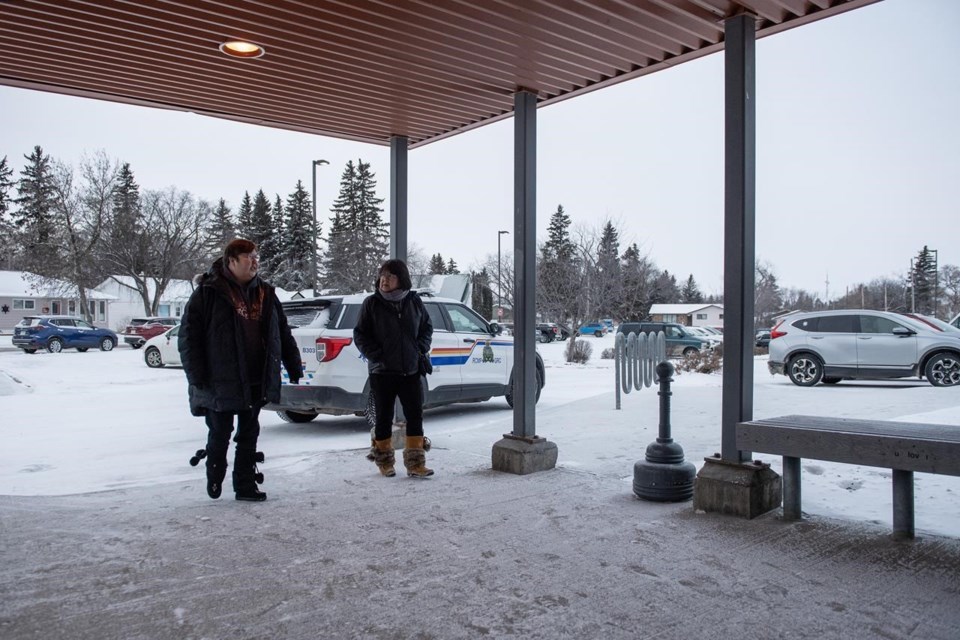MELFORT, Sask. — The man who went on a stabbing rampage on a Saskatchewan First Nation wasn't on the radar of the province's specialized enforcement team ahead of the massacre.
Myles Sanderson was unlawfully at large when he killed 11 people and wounded 17 on the James Smith Cree Nation and in the nearby community of Weldon, northeast of Saskatoon, on Sept. 4, 2022.
He died in police custody a few days later.
A warrant for Sanderson had been issued a few months earlier by Saskatoon police, Staff Sgt. Ryan How with the RCMP's Saskatchewan Enforcement Response Team told a coroner's inquest Monday.
The response team was not specifically looking for him, said How.
Sanderson had received statutory release in August 2021 after his first federal prison sentence. Four months later, he was found to have been lying about his living arrangements and his release was suspended. In February 2022, the parole board cancelled that suspension and Sanderson again received statutory release with a reprimand. That May, he was deemed unlawfully at large.
"That’s a lengthy time," Chief Calvin Sanderson of Chakastaypasin Band, one of three communities that make up James Smith, said outside the inquest.
"Leadership weren’t contacted by city police, (given) a red flag or anything like that.”
How said 52 others were unlawfully at large in Saskatchewan the day of the mass killing. There were 5,468 people on outstanding warrants.
The response team was established five months ahead of the killings. It's made up of RCMP's crime reduction team, a warrant enforcement suppression team and the Saskatchewan trafficking response team.
How said the response team's mandate is to go after the greatest threats to public safety.
Sanderson, before the massacre, likely wouldn't have been on its radar, How added. Sanderson had a long criminal record, but unfortunately that's not uncommon in people the team's looking for, the officer said.
When it became clear there had been a mass killing, How said, the team turned its focus to the case. It was a member of the team who took Sanderson into custody a few days after the attacks.
The inquest, now in its second week in Melfort, Sask., is to establish the events leading up to the killings, who died, and when and where each person was killed. The six-person jury can also come up with recommendations to prevent similar deaths.
A second inquest focusing on Sanderson's death is scheduled for February.
The inquest has heard that Sanderson had a history of violence and incarceration. His criminal history included 59 convictions as an adult; 35 were for failing to appear in court.
His common-law partner, Vanessa Burns, testified about 14 years of domestic violence by the father of her five children. She said Sanderson attacked her multiple times when she was pregnant.
RCMP said in an overview of the massacre that Sanderson went to the First Nation to sell cocaine. In the days before the killings, he caused chaos with his brother, Damien Sanderson.
Damien Sanderson was the first to be killed. Myles Sanderson then went door to door on the First Nation, stabbing and killing people.
An RCMP criminal profiler has testified some victims were targeted because Sanderson believed they were associated with a gang while others got in the way.
Sherri Jule, director of emergency medical services for northern Saskatchewan, told the inquest Monday that one ambulance went to a home to treat a stabbing victim but other emergency medical vehicles went to the band office.
"There were many patients, particularly at the beginning, (and) there weren't many paramedics on scene," she said.
Jule said a call came in at 5:44 a.m. that paramedics may be needed at the First Nation. An ambulance from Melfort was dispatched 17 seconds later and arrived at the First Nation at 6:23 a.m. Three people, two of whom were seriously injured, arrived at the Melfort hospital by 8:17 a.m.
Soon after that first call, the inquest heard it was clear there were many injured and the attacker was on the loose.
Jule said ambulances were staged at the band office, where police and a conservation officer could ensure safety.
"(Paramedics) felt very safe with having the policing present," she said, adding the injured were taken to the band office by community members or officers.
Jule said all three STARS air ambulances in Saskatchewan responded. Ambulances were dispatched from nearby Melfort, Tisdale and Prince Albert.
Sixteen patients were treated, she said, and they all survived.
Insp. Alex Heron with Provincial Protective Services said 53 members of the branch were called to the scene over four days, including highway patrol and conservation officers.
"We've had nothing to this scale before," Heron said.
Chief Calvin Sanderson said the inquest has been difficult on community members, but they hope recommendations can bring important changes.
"It’s been pretty emotional," he said.
This report by The Canadian Press was first published Jan. 22, 2024.
Kelly Geraldine Malone, The Canadian Press
Note to readers: This is a corrected story. A previous version misspelled the surname of Staff Sgt. Ryan How.



